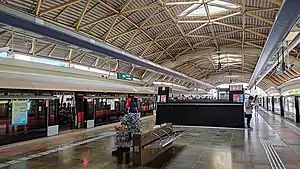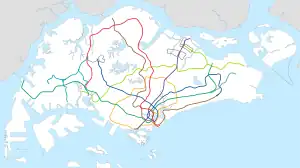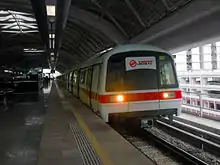EW28
Pioneer 先驱 பயனியர் | |||||||||||
|---|---|---|---|---|---|---|---|---|---|---|---|
| Mass Rapid Transit (MRT) station | |||||||||||
 The island platform of Pioneer station | |||||||||||
| General information | |||||||||||
| Location | 31 Jurong West Street 63 Singapore 648310 | ||||||||||
| Coordinates | 1°20′15.28″N 103°41′49.98″E / 1.3375778°N 103.6972167°E | ||||||||||
| Operated by | SMRT Trains Ltd (SMRT Corporation) | ||||||||||
| Line(s) | |||||||||||
| Platforms | 2 (1 island platform) | ||||||||||
| Tracks | 2 | ||||||||||
| Connections | Bus, Taxi | ||||||||||
| Construction | |||||||||||
| Structure type | Elevated | ||||||||||
| Platform levels | 1 | ||||||||||
| Parking | No | ||||||||||
| Bicycle facilities | Yes[1][2] | ||||||||||
| Accessible | Yes | ||||||||||
| History | |||||||||||
| Opened | 28 February 2009 | ||||||||||
| Electrified | Yes | ||||||||||
| Services | |||||||||||
| |||||||||||
| Location | |||||||||||
 Pioneer Pioneer station in Singapore | |||||||||||
Pioneer MRT station is a Mass Rapid Transit station in Singapore. It is part of the MRT East West Line and serves the residential estate of Pioneer. The station is located along Jurong West Street 63 and provides a convenient mode of transportation for residents and visitors to the area.[3][4]
Despite its name, Pioneer station is not physically located within the Pioneer planning area. Rather, its name was derived from Pioneer Road North, a major road to the west of the station that travels in the north–south direction. Pioneer station is currently the nearest MRT station to the Nanyang Technological University until 2029 when Nanyang Gateway and Nanyang Crescent stations along the Jurong Region MRT line opens.
It is one of two above-ground stations on the MRT network with a privacy screen built along the track of the eastbound platform to ensure the privacy of nearby residents; the other station being Marsiling MRT station.
History


Built along with Joo Koon, it was part of the Boon Lay Extension (BLE) project announced by the Land Transport Authority in December 2004 to help people working in the Jurong Industrial Area travel faster.[5]
The station opened on 28 February 2009 and following the opening, SBS Transit introduced a new feeder bus service 241 to provide bridging services for the N9 residents[6] and the Land Transport Authority carried out amendments and additions (A&A) works on Pioneer Road North, such as expanding the road and constructing an overhead pedestrian ramp bridge, as complements to the station to serve the residents of Nanyang and Pioneer.[7][8]
As with most of the above-ground stations built in the past along the East West line, it was initially built without platform screen doors that prevent commuters from falling onto the train tracks. Installation of the half-height screen doors eventually started on 21 June 2011. By 24 August that year, all of the screen doors were installed and began operations.[9]
The station was installed with high-volume low-speed fans, which commenced operations on 10 June 2012. It was the second station, after Tampines to have them installed.
References
- ↑ "SMRT > Trains > NetworkMap > Pioneer". www.smrt.com.sg. SMRT Corporation Ltd. Retrieved 10 September 2017.
- ↑ "SMRT Journeys". journey.smrt.com.sg. SMRT Corporation Ltd. Retrieved 10 September 2017.
Amenities
- ↑ "SMRT > Trains > NetworkMap > Pioneer". www.smrt.com.sg. SMRT Corporation Ltd. Retrieved 10 September 2017.
- ↑ "SMRT Journeys". journey.smrt.com.sg. SMRT Corporation Ltd. Retrieved 10 September 2017.
Pioneer
- ↑ "Expanding The Rail Network: LTA To Build Boon Lay MRT Extension". Land Transport Authority. 29 December 2004. Archived from the original on 13 May 2011.
- ↑ "New and Amended Bus Routes for Jurong West Residents". SBS Transit. Archived from the original on 16 March 2009.
- ↑ Widening of Pioneer Road North between PIE and Jurong West Avenue 4
- ↑ Award of Contract for the Widening of Pioneer Road North between Jurong West Avenue 4 and AYE
- ↑ Wong, Siew Ying (January 26, 2008). "Above-ground MRT stations to have platform screen doors by 2012". Channel NewsAsia. Archived from the original on July 30, 2012. Retrieved February 1, 2012.